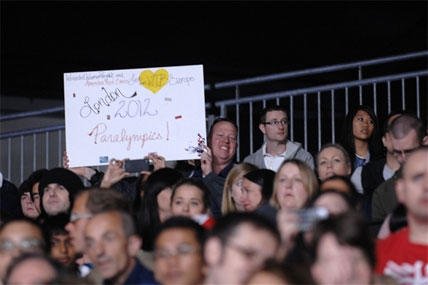LONDON – A group of Europe-based wounded warriors took the opportunity to get some relaxation with a trip to observe the 2012 Paralympic Games.
Soldiers assigned to Warrior Transition Units, participating in adaptive reconditioning programs in Germany, Italy and Belgium, received passes to London’s ExCel Centre to watch events such as table tennis and judo.
Christopher Ebner, the battalion occupational therapist for the Heidelberg, Germany-based Warrior Transition Battalion led a group of 17 wounded warriors and 4 clinical staff to the Paralympic Games.
“We started planning this trip, logistically, back in June,” he said. “[Thanks to] a very nice gift from the U.S. Paralympic Committee and the Wounded Warrior Project and Red Cross we were able to [bring] this trip to fruition.”
“The purpose of this trip … is to focus on motivating all of our soldiers that are participating in adaptive rehabilitation programs in our battalion as part of their rehabilitation process,” Ebner said.
Once the soldiers complete the process, Ebner said, they will either return to duty or transition back to the civilian sector.
“The other piece of that is … having those soldiers come to the Paralympic Games to witness, firsthand, the level of achievement these athletes are able to [reach, regardless] of their injuries,” he said.
Army Sgt. George Peterson, a heavy equipment operator assigned to Company C of the Warrior Transition Battalion, explained his motivations for seeing the games.
“[I wanted to] see the Paralympic Games, see the players and see how they manage to deal with their disabilities,” he said. “It's pretty awesome. We saw a lot of cool stuff and I've been waiting to come see the games.”
The athletes competing at the Paralympic Games “are amazing,” Peterson said.
“These guys aren't just disabled athletes,” he said. “It's incredible how they do it. I've never seen something so incredible -- the way they manage, the way they deal with their disabilities.”
Peterson explained he was assigned to the WTU after he experienced an improvised explosive device attack during his last tour in Iraq. He said he developed bad migraines, post-traumatic stress and “couldn't really function well” in his unit.
Peterson praised the WTU for its commitment to helping soldiers rehabilitate their lives.
“They really helped me out so I could take care of my future,” he said. “They have a lot of great people that help you out. It's a classy, awesome organization. You couldn't ask for anything better.”
Army Sgt. 1st Class Donna Mack, a senior logistician, said she was especially grateful to the sponsors who helped to make the trip happen.
“I really appreciate the WTU, Wounded Warrior Project, and Red Cross for affording us the opportunity to come here,” she said. “We've had some exciting times.
“We saw Big Ben, we went to Buckingham Palace and saw the changing of the guards,” she continued, “and I'm actually in London to see the Paralympics which I've never done before. This is a first time for me, so this is a wonderful opportunity.”
Mack said she was inspired by the determination of the Paralympians to continue fighting regardless of their disabilities.
“I have knee issues -- I've had three right knee surgeries,” she said. “To actually see those people out there going at it, being able to do anything that they wanted to do, that means something to me.”
Mack, who was assigned to the WTU in April, said she injured her knee during a Humvee rollover accident during training for deployment to Afghanistan. She noted she still deployed, despite her knee ailments.
“This right here is an opportunity to show what I can do as long as I [fight] to reach my accomplishment,” she said of the Paralympic Games.
Mack and two other soldiers proudly waved signs supporting U.S. Paralympic athletes as they watched the competitions.
“This is to support Team USA,” she said. “The Red Cross in … Germany made [the signs] for us, and they afforded us the opportunity to bring them here. Go USA!”






























